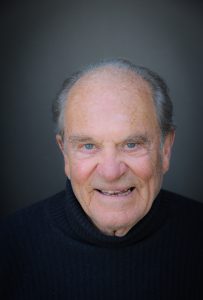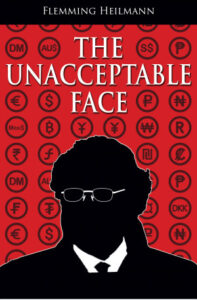
Flemming Heilmann was born 1936 in Malaya of Danish parents, spending his early childhood there until the threat of Japanese invasion forced an evacuation to Australia in 1941. Joined later by his father who escaped Singapore as she fell, the family spent World War II as refugees. As soon as the war ended in Europe, but before the Japanese capitulation, the family traveled home to Denmark on a troopship evading kamikaze attacks in the Pacific.
Flemming’s school education spanned Australia, Denmark – where he sank deep cultural roots – and formative years in the United Kingdom before he graduated from Cambridge with a law degree. During this period he spent time in British colonial Malaya during the communist uprising before its independence, in Swaziland under British rule, and in South Africa while apartheid laws were being put into place. During the post war recovery, Flemming developed an appreciation of America’s role in the rehabilitation of war torn Europe and an understanding of the mighty US economic engine driving economic, technological and social progress in the world. A 40-year executive career in industry took him back to South Africa for 17 years and on to the USA in the mid-1970s with stints in Europe and Canada. Flemming lives with his wife Judy in Rowayton, has four sons, a daughter and nine grandsons.

Flemming is a member of the DMA, and last spoke to us in early 2019, when he discussed his book, Odyssey Uncharted, a memoir of his World War II childhood and subsequent worldwide education. In his latest book, The Unacceptable Face, he relates his encounters with apartheid, socialism and iterations of capitalism on three continents during a career challenged by corporate and national politics. Some foes are engaged, others sidestepped. Immersion in disparate cultures spawns evolving beliefs and priorities, not always politically correct, just as traditional preconceptions are debunked.
Arranged by Bryan Hooper
Bryan’s notes on the talk:
Flemming Heilmann recounted to us highlights from his second memoir, The Unforgettable Face, which picks up from his first book, Odyssey Uncharted, with Flemming as a recently graduated Cambridge law student about to take up a position as a market research clerk in the South African subsidiary of the British firm, Metal Box Company, in 1959. He arrived in the country during the heyday of apartheid, the institutionalized racial segregation policy introduced by South Africa in 1948, and he experienced at first hand the problems involved in managing a company under conditions totally alien to those experienced in the UK in terms of labor relations.
He also managed to meet and began to understand the nascent opposition to the government as he was introduced to Helen Suzman, the solitary member of parliament for the Progressive party for 13 years, and also Arthur Goldreich and Harold Wolpe. The latter two owned Lilieleafs Farm, which served as the secret headquarters of the SA Communist Party, and who clandestinely encouraged the opposition African National Congress, which included the future President, Nelson Mandela, as one of its members. It was at an upscale dinner party held at the farm that Flemming and his fellow guests were served dinner by immaculately dressed waiters, one of whom happened to be Nelson Mandela. The government cracked down on the illegal farm operation in 1962 and subsequently jailed Mandela until 1990. Goldreich and Wolpe ended up in police detainment, but escaped dressed as Franciscan monks and made their way to Swaziland and eventual freedom.
Flemming was gradually promoted through the ranks of Metal Box, eventually becoming Managing Director and CEO in 1970, and ensured during his time in charge that employees were treated to a decent wage, and were given education and training opportunities that amounted to an additional 75% of costs above the wage bill. Nevertheless, Metal Box became a victim, amongst other companies, of an intense press exposé led by a UK journalist. In turn, this became the focus of a British parliamentary inquiry necessitating the provision of much data and Flemming’s being a witness at the subsequent hearings in Westminster, England. The allegations that his company were underpaying workers by 30% were repudiated and Flemming and his colleagues left the hearing to applause from the press.
Flemming moved on from South Africa to join Continental Can in the US at their Rowayton headquarters. Assignment to Europe to manage their German and Dutch manufacturing acquisitions gave Flemming a lesson in the socialistic operations prevailing in manufacturing at that time, but he managed to turn around the numbers and become profitable. Unfortunately, he was fired from his position for, as he says, speaking his mind, but moved on, still within the packaging industry, ending up in Canada as the President and CEO of a leveraged buyout firm in Toronto. Flemming is a great admirer of LBOs in general, but allows that there are excesses that can arise (hear his interesting anecdote on this subject during the talk on the video link on the website).
The next phase of his life drew Flemming into volunteer and charitable work in the US with several organizations associated with Denmark, including the Olympics and the Paralympics, and he is especially proud of his work with the Jacob Rees Neighborhood Settlement in New York, whose mission emphasizes self-help for immigrant populations and realistic goal-setting and accomplishments. He is more than pleased that 88% of participants in their programs graduated from high school compared with the average population at 48%.
Finally, Flemming talked briefly and passionately about two of his hobby-horses, public education for one, and inequality for another. Clearly, he believes that the future of the country depends on the establishment of a strong middle class, necessitating fair and equal access provision to education and training.
More details of Flemming’s fascinating life can be found in his book, The Unacceptable Face, and the video is on the website at https://youtu.be/xxgsLRYEXz0.
